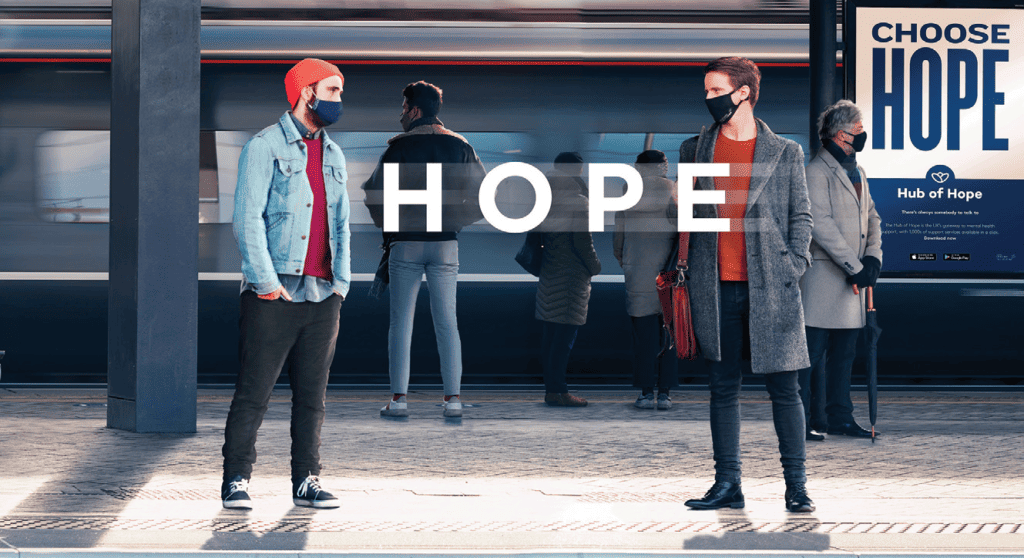In these unsettling times, I often find it difficult to know where to turn. A few days ago, during prayer, I started to pick up on the word ‘hope’ in the Psalms. Coincidentally, I also came across the same word in the context of my studies. I started to perceive that God was telling me something and decided to look into this topic more. By doing so, I felt I was offered an attitude with which to look problems square in the eye without feeling crushed. Let’s go on a journey of discovering the virtue of hope.

The definition of hope in the Cambridge English Dictionary is: ‘to want something to happen or to be true, and usually have a good reason to think that it might.’
St. Thomas Aquinas wrote that hope is born from the desire for something good that is ‘difficult but possible to attain.’ He also observed that there are far more reasons to be hopeful ‘when we have friends to rely on’ (Summa Theologiae, II-II, 17, 8).
Hope is a key concept in many of the world’s religions. In the Christian tradition, hope is one of the three theological virtues, alongside faith and love. According to the Bible search tool ‘Blue Letter Bible,’ in the New International Version translation, the word ‘hope’ appears 167 times.
When I think about hope, one of my favorite poems by Rainer Maria Rilke (Austrian poet, 1875 – 1926) comes to mind. It’s from his ‘Stundenbuch,’ the Book of Hours (I 59) and its title is ‘Geh bis an deiner Sehnsucht Rand’ – ‘Go to the limits of your longing.’ I like the translation by Joanna Macey and Anita Barrows:
Go to the limits of your longing
God speaks to each of us as he makes us,
then walks with us silently out of the night.
These are the words we dimly hear:
You, sent out beyond your recall,
go to the limits of your longing.
Embody me.
Flare up like a flame
and make big shadows I can move in.
Let everything happen to you: beauty and terror.
Just keep going. No feeling is final.
Don’t let yourself lose me.
Nearby is the country they call life.
You will know it by its seriousness.
Give me your hand.
By saying ‘go to the limits of your longing,’ Rilke suggests to always search in everything that happens, the face of our loving God — in each fact of life — as it is given to us. The line ‘let everything happen to you: beauty and terror. Just keep going. No feeling is final,’ speaks to me about hope, about the attitude we are invited to have in front of everything; not to lose sight of the one and only important thing everything pivots around, the mystery that Jesus Crucified, Forsaken and Risen has introduced us to: the inextricable oneness of death and resurrection. To me it appears that Jesus Forsaken is our God of hope.
Chiara Lubich once said about hope: ‘In our thoughts and in our sentiments, may we always hope and go beyond all the limits that human life sets before us, and constantly, through force of habit, tend towards universal brotherhood in one Father: God’ (God Loves You Immensely, p. 57).
The psychology of hope
Through articles I read recently, I realized that also psychology has taken a major interest in hope. Some studies have shown that hope can be an important part in the recovery process from illness with powerful psychological benefits for patients, helping them cope more effectively with their symptoms. Psychology describes that hope is not wishful thinking and is not optimism either; it is not an emotion or a feeling, it is a way of thinking. And because of this, it can be learned and practiced. Hope is considered a cognitive practice that involves the intentional act of setting goals and working towards them with purpose. Hope goes beyond optimism because it says that we have the power to work for a better future. It gives us agency. That resonated with me. In this way, hope can be seen as the virtue in response to despair. This also connects to Chiara Lubich’s words: ‘In our thoughts and in our sentiments, may we always hope and go beyond all the limits.’
‘In our thoughts’ — here is the way of thinking. ‘Going beyond all limits that life sets before us’ – here is the action/practice in real life. In psycho-education, hope is made up of three things: goals, pathways and willpower (willpower, especially in the face of adversity).
The goal that those of us who feel called to live according to the spirituality of unity, is to live and work for the fulfillment of Jesus’ last prayer and testament ‘that all of them may be one, Father, just as you are in me, and I am in you’ (Jn 17:21).
Our pathway is an ever renewed love for Jesus Crucified and Forsaken; and walking this road together by giving of ourselves, serving one another so that Christ can be present among us (Mt 18:20).
Willpower can be achieved and maintained by our faithfulness in doing small acts of kindness and compassion, such as being present to the joys and sorrows of others, extending the hand of friendship, or sharing a meal with someone.
The other day, while commuting to work, I saw a banner by NetworkRail that said: ‘There’s always hope.’ Maybe, this can inspire us to consciously use the three steps ‘goals, pathways and willpower’ to make the virtue of hope a practice in our daily lives.
Elisabeth Öhlböck
(New City, London)




